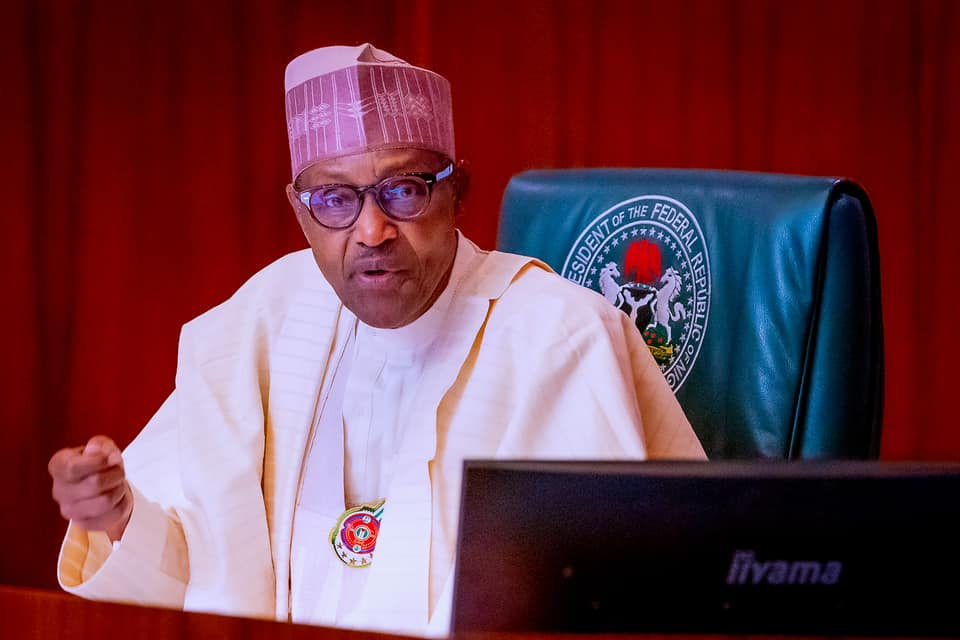What’s left of the Buhari brand is the illusion of his anti-corruption standing sold, especially, to a hero-starved country as the last hope of a people held to ransom by a class of thieving elite. Even as the man’s mask began to slip barely halfway through his first tenure, his media handlers and supporters were unwilling to come to terms with the obvious—that he’s not the bogeyman praised in viral political songs as the jailer of corrupt public officials.
In one of the tributes to Buhari ahead of the 2015 presidential election, the Hausa musician, Rarara, idealized his candidacy and predicted his coming in the song “Masu Gudu” as the reason corrupt politicians would go into hiding or flee the country to escape his justice. The wrath he promised in campaigning from Abia to Zamfara appealed to Nigeria’s serially-robbed poor demographic, the oldest of whom were cheerleaders of his mass incarceration of the rich in his first stint as military head of state, and it built a cloud of optimism upon his government.
The report that the Buhari-led National Council of State had pardoned 159 prisoners last Thursday, among whom were former Governors Jolly Nyame and Joshua Dariye, could’ve only shocked those who had been in a coma for the past seven years, but the symbolism of such a decision is haunting. The two politicians qualify for the fleeing fugitives in Rarara’s malarial imagination of Buhari’s Nigeria, and the villains of the poor the President had pledged to keep behind bars if elected.
In May 2018, when Justice Adebukola Banjoko of the Federal High Court, Abuja, handed Governor Nyame a 12-year jail sentence with the option of a N100 million fine, she remarked that she was “morally outraged by the facts of this case,” and that “the people of Taraba State had elected the defendant, a clergyman, on three different occasions.” She noted that their “expectations must have been very high,” and wondered thus: “How would he begin to explain to the people of Taraba State his actions? How would he explain such a colossal loss to the people?”
Nyame, an ordained reverend and holder of a Theology degree, was given opportunities thrice to guide the fortune of Taraba State. He was its first elected Governor, a three-time Governor of a state now languishing at the bottom of Nigeria’s poverty index. In the 2019 Poverty and Inequality in Nigeria document of the National Bureau of Statistics, a year before his sentence was affirmed by the Supreme Court, Taraba State was ranked the second poorest state in Nigeria, with a frightening 87.72 percent of its population categorized as poor.
Convicted of criminal misappropriation and criminal breach of trust, and found guilty of stealing N2 billion from the people of Plateau State, Governor Dariye too couldn’t escape the consequences of his transgressions between 1999 and 2007. He was in the same class as Nyame, and both were clannish figures more committed to exploiting the divisions in their state than prioritizing the business of governance. Their theft didn’t make them communal pariahs; in fact, Dariye was In Abuja representing his people at the Senate when Justice Banjoko’s gavel alarmed him to ponder the reality of life in Kuje Prison.
It took about thirteen years to secure the justice that got the politicians caged where they belonged, and the vast resources of the Nigerian state to prosecute them. The governors’ jail sentences were intended to rattle the camp of our political elite and establish the fact of their fragility in a system that had treated their ilk as invincible and enabled their disregard for the rule of law and theft of public funds. And Buhari, who came to power with the promise to send thieving public officials to prison and neutralized their existence in our public institutions, has chosen to pardon politicians whose incarceration ought to be the symbol of his renewed commitment to a glaringly-underwhelming anti-graft war.
When, as President, Jonathan granted a similar pardon to a set of VIPs, it was easy to establish that the main target of such abuse of power was his influential former boss and former Governor of Bayelsa State, Chief Diepreye Alamieyeseigha, a fugitive of justice still wanted abroad on money laundering charges. Even for a government already written off by a segment of the country over its tolerance of corruption, the decision was interpreted as a middle finger to the grumbling citizens.
A justice system that has a goat thief wasting away in an overcrowded prison while pardoning the politicians who masterminded bureaucratic heists that left millions of their people poorer and dead is simply a lifeline for potential political allies. Behind the fancy grammar on the legality of pardon is the ambition of the political class to expand their political capital and influence, and the VIP ex-convicts are coming back to play a critical role in the approaching election year.
Nyame and Dariye are not political upstarts. They may be returning to hostile media coverage, but fanfare in their communities. They may be villains in our stories and Justice Banjoko’s court, but victims of some imaginary political vendetta to their communities and, very significantly, grassroots mobilizers for the powers that be. Their political classmate, James Ibori of Delta state, was able to press the right electoral buttons even as a prisoner in the UK. He returned to sit on the throne of his political empire during Yar’adua’s government.
Buhari’s politically-advantaged ex-convicts aren’t coming home to become pariahs. They are awaited by impressionable poor communities stuck in a peculiar Stockholm Syndrome and, this time, they have a story to tell: they are likely to share that they were victims of some sophisticated witch-hunt. The transition from accusations of money laundering or corruption to high political office is a familiar life for the Nigerian elite. This is only a dent for the distant and intellectual observers of the system. Umaru Fintiri, for instance, wriggled himself out of an almost certain jail sentence over theft of about N3 billion when he took power as acting Governor to emerging as elected Governor of Adamawa State. We must brace up for these calamities broken out of prison by Buhari.

 Join Daily Trust WhatsApp Community For Quick Access To News and Happenings Around You.
Join Daily Trust WhatsApp Community For Quick Access To News and Happenings Around You.


